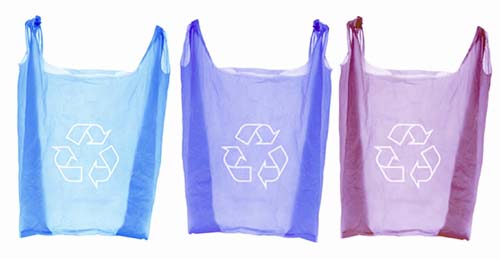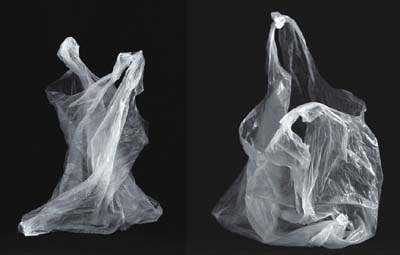Water soluble, drinkable plastic bags
Many people use plastic bags when they go to the supermarket shopping or the grocery market. However, ordinary plastic bags are extremely difficult to degrade, resulting in "white pollution" has become a global environmental problem. In recent years, many countries began to implement "plastic limit order" "plastic ban order". What to replace plastic bags? Recently, a Chilean company came up with a solution -- a new type of plastic bag that dissolves when you put it in water.
It dissolves in water and takes five minutes to degrade

From the appearance, this new type of plastic bag is no different from ordinary plastic bags. However, putting the new plastic bags into a pot of normal-temperature water and stirring them can make a difference. The plastic bag dissolved in water and became a milky liquid. Not only that, but the water that's dissolved is drinkable, and it's drinkable, so you have to be concerned about whether it's harmful. The so-called new plastic bags were actually developed by a Chinese company. The company works with a Chilean company to plan mass production in Chile. The plastic bag is harmless to humans, the researchers said. The main ingredient is polyvinyl alcohol, a water-soluble biodegradable material made from calcium carbonate or natural gas. While the raw material of ordinary plastic bags is polyethylene, which is derived from petroleum. It is extremely difficult to degrade in the environment, and it is difficult to recycle. An ordinary plastic bag takes hundreds of years to degrade, while a polyvinyl alcohol water-soluble bag takes only five minutes.
If the polyvinyl alcohol water-soluble bag is thrown into the sea, it will dissolve and disappear quickly in the seawater, and eventually degrade completely into water and carbon dioxide through microorganisms, without forming "white pollution" like ordinary plastic bags.
Will this kind of water-soluble plastic bag melt in rainy days?
Of course, some people also worry that if the new plastic bags dissolve in water, it will not be very useful to carry them in rainy days. , the researchers said they would design products of different water soluble temperature from room temperature 25 ℃ to 75 ℃, and then to 90 ℃. In countries where it often rains, plastic bags can be dissolved at high temperatures.
The researchers also say that water-soluble bags now cost three to four times as much as regular plastic bags, and the company plans to start mass production by the end of this year. At that time, they expect that the price of water-soluble plastic bags can be similar to that of ordinary plastic bags, and truly enter people's lives.
Control plastic waste and introduce edible alternatives in many countries
As of July 2017, more than 9.1 billion tons of plastic were produced worldwide. The United Nations says about 12 million tons of plastic will be in landfills and the environment by 2050 unless people change their consumption patterns and waste management.
Plastic waste pollution, countries around the world a headache. In fact, in addition to Chile's soluble plastic bags, other countries have introduced some edible plastic alternatives.
Edible water pellets biodegradable a British company has developed an edible water pellet, a replacement for plastic bottles. Water ball has a double membrane, the main composition of the membrane is a natural seaweed extract, harmless to the human body.
When drinking, you only need to tear the first membrane of the water ball, and the water, beverage or wine in the second membrane can be put into the mouth to drink. The first layer is edible, and even if you don't want to eat it, it will decompose naturally within four to six weeks without contaminating the environment.
Cereal is made into spoons, which are safe, non-toxic and edible. In addition to plastic bottles, plastic spoons also have edible substitutes. An Indian company has introduced a completely non-toxic edible spoon. The spoon is made of a mixture of sorghum flour, rice flour and wheat flour without preservatives. Pizapati, the company's founder, says the spoon is not only uncoated, but edible, tasty and nutritious.
Three edible alternatives to an alternative plastic cup are made in Indonesia. Made of natural materials and free of preservatives and gelatin, the "seaweed cup" is healthy to eat. While many people may be concerned about the taste of the seaweed cup, many who have eaten it say it tastes good and that there are three flavors to choose from. In addition to replacing plastic cups, seaweed cups can also replace ice cream cones. A local ice cream shop has already started using the "seaweed cup" to hold its ice cream.
Edible plastic bags ashworth hecht, founder of an environmental company in India, has developed an edible plastic bag. Edible plastic bags are made from 12 raw materials including potato flour, sweet potato flour and vegetable oil. The product is already used in chain stores in India, Qatar and the united Arab emirates.

